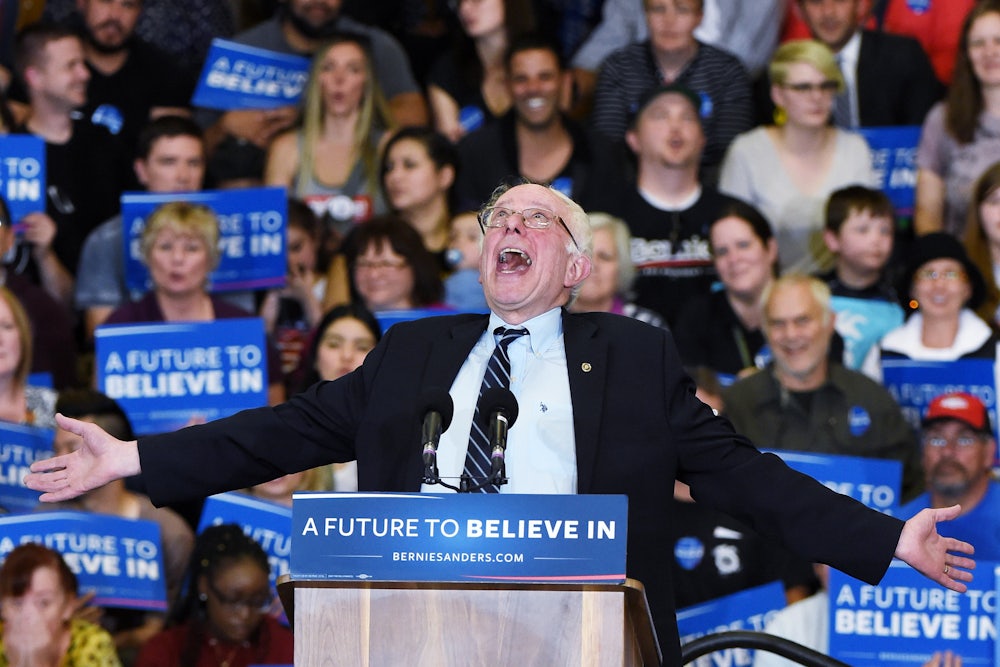Super Tuesday, the presidential primary season’s day of reckoning, is upon us. So why is it such a big deal? And how does it work? Here’s the lowdown.
The History
Think of Super Tuesday as the Mormonism of U.S. election traditions: surprisingly new, and rife with mystifying mechanics. While there had been “Super Tuesdays” in previous cycles, the current version dates to 1988, when nine Southern states held their contests on the same day. Super Tuesday was designed partly as an antidote to the hyper-local retail politics of early primary and caucus states—also known as Iowa Syndrome. Clustering a number of primaries together means (theoretically, at least!) that candidates have to discuss national issues like foreign policy and the economy, rather than pandering to voters in specific states.
You also might hear the name “SEC Primary” being thrown around. That’s in reference to the Southeastern Conference, the big collegiate athletic conference down South. A half-dozen Southern states with SEC teams will have delegates at stake on Tuesday. Back in the ‘80s, Southern Democrats pushed heavily for a Dixie-fied Super Tuesday, hoping that Southern voters would help lift a moderate, “electable” candidate to the nomination. But the strategy backfired, with centrist favorite Al Gore splitting Southern votes with the other contenders like Michael Dukakis, the eventual nominee. In 1992, however, it worked: Super Tuesday played a key role in propelling Bill Clinton to victory.
The Mechanics
Voters in 13 states and one U.S. territory will head to the polls—the most of any day in the primary season. Two states, Wyoming and Alaska, will only hold Republican contests, while 11 others will host caucuses or primaries for both parties: Alabama, Arkansas, Colorado, Georgia, Massachusetts, Minnesota, Oklahoma, Tennessee, Texas, Vermont, and Virginia.
More than one-fifth of all delegates are up for grabs: 595 Republicans and 865 Democrats, along with 150 additional Democratic superdelegates. (The unpledged superdelegates are drawn from current party officials and office holders, including former presidents, acting governors and congressional leaders, and former party chairs. They’re free to vote for whomever they want, independent of what the voters in their states decide.)
Delegates in the Super Tuesday states are awarded proportionally—i.e., the candidates win delegates in proportion to the share of votes they get in a state’s primary or caucus. For Democrats, the proportional-allocation setup is designed to keep the delegate count close as the primary process unfolds.
The Republicans, however, use a system of “minimum thresholds,” meant to tilt the scales toward winners. In many of the Super Tuesday states, if a candidate earns 50 percent of the vote, he can walk away with all the delegates. Meanwhile, Ted Cruz, Marco Rubio, John Kasich, and Ben Carson could be shut out of winning delegates if they miss the states’ threshold marks. The thresholds vary state to state, from 5 percent in Massachusetts to 20 percent in Texas and other states. (After March 14, GOP primaries are allowed to use “winner-take-all” rules. Nine states will use these rules, including Florida and Ohio on March 15.)
The Races

On the Democratic side, Hillary Clinton comes in with the momentum against Bernie Sanders, particularly after her overwhelming victory in South Carolina’s primary this past weekend. Given her sizable edge among African American voters in particular, she should roll to easy victories in the Southern states with large minority populations: Alabama, Arkansas, Georgia, Tennessee, Texas, and Virginia.
To prevent a wipeout—and maintain an outside shot at the nomination—Sanders needs to win in four non-Southern states: Vermont, Minnesota, Colorado, and Massachusetts. Though the Northeast is his stronghold, a new poll shows Clinton leading in Massachusetts, which would be a very bad omen for his campaign.
Among Republicans, Donald Trump’s lead only continues to grow, and polls show him ahead in nine of the eleven states where the GOP holds contests. Ted Cruz is trying to hold on to Texas, where Trump’s momentum threatens to upset the senator’s home-state advantage. Marco Rubio is not projected to win any Super Tuesday states outright, but he hopes to accumulate a fair share of delegates by targeting delegate-rich suburban areas, as the New Republic’s Laura Reston notes.
John Kasich, who’s pinning his long-shot hopes on winning the Ohio primary on March 15, has acknowledged the dim chances of his campaign seeing any Super Tuesday success. “I think Trump’s probably going to win probably all of them,” he told CNN.
Delegate Counts and Poll-Closing Times
Follow along with New Republic Minutes throughout Tuesday evening as the results roll in.
7 p.m. ET
- Georgia: 102 Democratic delegates | 15 Democratic superdelegates | 76 Republican delegates
- Vermont: 16 Democratic delegates | 10 Democratic superdelegates | 16 Republican delegates
- Virginia: 95 Democratic delegates | 14 Democratic superdelegates | 49 Republican delegates
8 p.m. ET
- Alabama: 53 Democratic delegates | 7 Democratic superdelegates | 50 Republican delegates
- Massachusetts: 91 Democratic delegates | 25 Democratic superdelegates | 42 Republican delegates
- Oklahoma: 38 Democratic delegates | 4 Democratic superdelegates | 43 Republican delegates
- Tennessee: 67 Democratic delegates | 8 Democratic superdelegates | 58 Republican delegates
8:30 p.m. ET
- Arkansas: 32 Democratic delegates | 5 Democratic superdelegates | 40 Republican delegates
9 p.m. ET
- Colorado Democratic Caucus: 66 Democratic delegates | 12 Democratic superdelegates
- Minnesota: 77 Democratic delegates | 16 Democratic superdelegates | 38 Republican delegates
- Texas: 222 Democratic delegates | 29 Democratic superdelegates | 155 Republican delegates
12 a.m. ET
- Alaska Republican Caucus: 28 Republican delegates
Other
- American Samoa Democratic caucus: 6 Democratic delegates | 4 Democratic superdelegates
- Democrats Abroad (voting ends March 8): 21 Democratic delegates
- Colorado and Wyoming Republican caucuses: We won’t see results from these two states on Super Tuesday; they’ll only begin to select delegates via precinct caucuses. The process will continue throughout the month.
